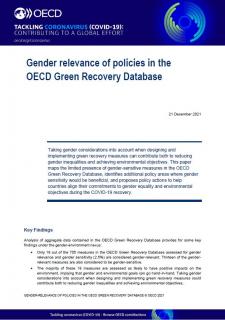
A gendered approach to the green recovery can put economies on a more inclusive, sustainable and resilient path by supporting and contributing to better healthcare systems, food security, more sustainable work and entrepreneurial opportunities for women, more sustainable mobility practices, as well as more sustainble production and consumption patterns.
However, only 18 out of the 705 measures in the OECD Green Recovery Database assessed for gender relevance and gender sensitivity are considered gender-relevant. Taking gender considerations into account when designing and implementing green recovery measures can contribute both to reducing gender inequalities and achieving environmental objectives.
This paper maps the limited presence of gender-sensitive measures in the database, identifies additional policy areas where gender sensitivity would be beneficial, and proposes policy actions to help countries align their commitments to gender equality and environmental objectives during the COVID-19 recovery.
